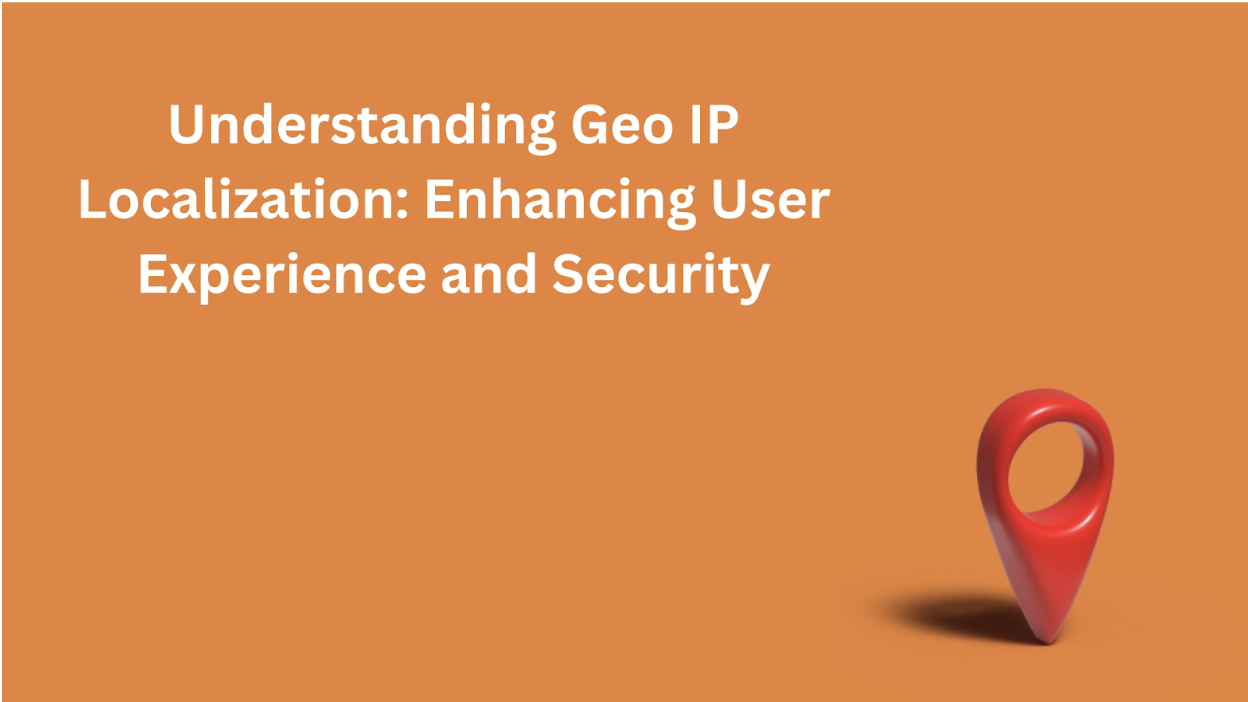In the vast internet landscape, understanding your users' geographical locations can be a powerful tool. Geo IP localization, the process of determining a user's geographic location based on their IP address, has numerous applications in improving user experience, enhancing security, and personalizing content delivery. In this blog post, we'll explore the basics of Geo IP localization, its benefits, and how it's commonly used today.

What is Geo IP Localization?
Geo IP localization is the process of mapping an IP address to a geographic location, such as a country, region, city, or even latitude and longitude coordinates. This mapping is typically done using a database that contains information about the geographic location of IP addresses.
By analyzing the IP address of a user, websites, and applications can determine their approximate location.
How Does Geo IP Localization Work?
Geo IP localization works by comparing a user's IP address to a database of known IP address ranges and their corresponding geographic locations. This database, known as a GeoIP database, is regularly updated to ensure accuracy. When a user accesses a website or application, their IP address is analyzed, and the corresponding geographic location is determined based on the information in the GeoIP database.
Benefits of Geo IP Localization
Geo IP localization can personalize content based on a user's location. For example, a website can display content in the user's native language or show promotions and offers relevant to their region.
Geo IP localization can also detect and prevent fraudulent activities, such as online fraud or unauthorized access. By analyzing users' geographic locations, websites can identify suspicious behavior and take appropriate action.
Geo IP localization enables businesses to target their marketing efforts more effectively. By understanding their audience's geographic location, businesses can tailor their marketing campaigns to specific regions, increasing their chances of success.
Geo IP localization can help businesses comply with regional regulations like data protection laws. Businesses can avoid legal issues and maintain customer trust by ensuring that data is stored and processed in the correct jurisdiction.

Common Uses of Geo IP Localization
- Websites can use Geo IP localization to display content in the user's preferred language, currency, or timezone.
- Businesses can use Geo IP localization to deliver targeted advertisements based on a user's location.
- Geo IP localization can detect and prevent fraud like account hijacking or online scams./li>
- Websites and applications can use Geo IP localization to restrict access to content based on the user's location.
Conclusion
Geo IP localization is a powerful tool to enhance user experience, improve security, and personalize content delivery. By understanding their users' geographic locations, businesses can tailor their services to meet their needs more effectively. However, it's important to remember that Geo IP localization is not always 100% accurate and should be used with other data sources for best results.
FAQs
Is Geo IP Localization Always Accurate?
While Geo IP localization is generally accurate, it can sometimes be affected by factors such as VPNs, proxies, and mobile networks. These can mask the true geographic location of a user's IP address.
Can Geo IP Localization Be Used to Track Individual Users?
Geo IP localization is typically used to determine the geographic location of a group of users, rather than track individual users. However, in some cases, it can be used for more targeted tracking purposes.
How Often Is the Geoip Database Updated?
The GeoIP database is regularly updated to ensure accuracy. Depending on the provider, updates are typically released monthly or quarterly.
Can Geo IP Localization Be Used for Mobile Devices?
Yes, Geo IP localization can be used for desktop and mobile devices. However, the accuracy of Geo IP localization for mobile devices can be affected by network connectivity and GPS data.
Is Geo IP Localization Legal?
Yes, Geo IP localization is legal in most jurisdictions. However, businesses should ensure compliance with local data protection laws and regulations when using Geo IP localization.